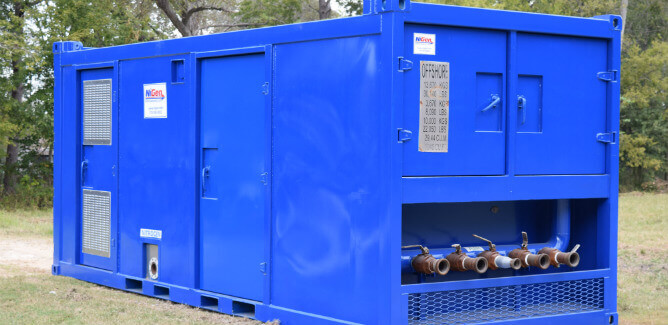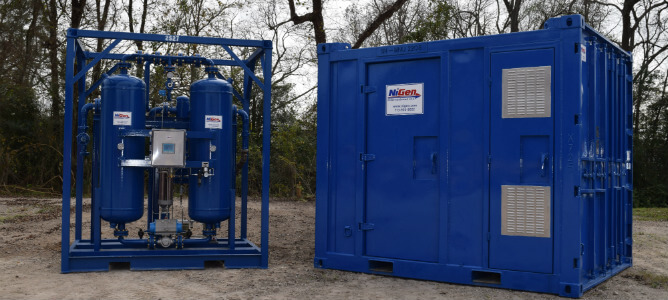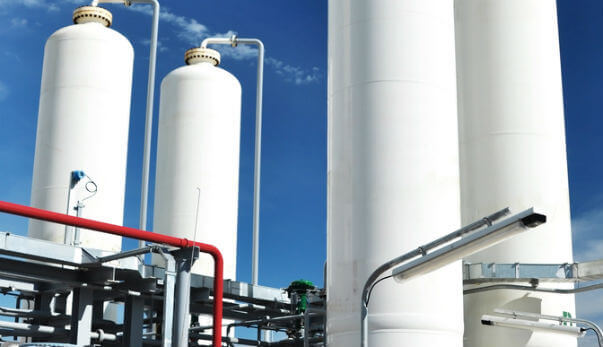
Industrial Preparation of Nitrogen Gas – How is Nitrogen Gas Produced?
Nitrogen is one of the most abundant naturally occurring elements in nature. In its compound form, it can be used in industrial applications from medicine to food manufacturing to oil and gas production.
In this article, we will consider how nitrogen is produced on an industrial basis.
The Main Methods of Nitrogen Gas Generation
The generation of nitrogen gas on an industrial scale is usually done via three core methods.
- Pressure swing absorption (PSA)
- Membrane nitrogen generation
- Fractional distillation
The nitrogen gas generation technique for your application will depend on the industrial-grade nitrogen purity that you require. How do nitrogen generators work according to each of these working principles?
PSA Nitrogen Generation
This method of nitrogen production works on the principle of differential separation of a gaseous mixture when passed through an adsorbent material. Special adsorptive material will separate gas fractions based on their molecular characteristics using a two-stage process:
Adsorption
Adsorption is the first stage of nitrogen gas production using the PSA method. This system features two adsorptive towers filled with carbon molecular sieve adsorbent material which selectively adsorbs oxygen allowing nitrogen-rich air to pass through the chamber and into a collection tank
Desorption
This is a straightforward reversal of the adsorptive process. While one chamber is in the adsorption process, the other is simultaneously engaged in desorption. This second stage releases the oxygen trapped by adsorption and allows the renewal of the adsorptive tower in preparation for another cycle of adsorption. The entire process nitrogen production from air using PSA is relatively fast – taking an average of sixty seconds per cycle.
Membrane Nitrogen Generation
Membrane filtration technology depends on the use of a semipermeable membrane which selectively separates air into its constituent gases depending on their varied speeds of travel. The membrane surfaces are shaped in hollow fibers, which provide a larger surface area for faster rates of selective adsorption.

Hollow fiber nitrogen membranes are perfect for on-site nitrogen generators, as they are relatively quiet and safe to operate.
The most vital components involved in the industrial preparation of nitrogen gas using semipermeable membranes are highlighted below:
Feed Filter Coalescers
Every membrane-mediated nitrogen gas manufacturing process requires a protective filtration unit that will protect the membrane from the damaging effects of moisture from the compressed air sample.
Immersion Heater Units
Immersion heaters are vital components of membrane filters used in the industrial preparation of nitrogen. These heaters will superheat the air entering the adsorptive membrane to ensure any liquids that may have gotten past the feed filter coalescers do not reach the adsorptive membranes.
Activated Carbon Filters
Heated air supplied from immersion heaters passes over beds of activated carbon which will absorb any hydrocarbon vapor impurities before the air enters the filtration membranes.
Particulate Filter
A particulate filter is the last screening step in the production of nitrogen gas using selective membranes. This filter acts as a sieve for particles as small as 0.01 microns before the air enters the membranes.
Fractional Distillation
Fractional distillation is one of the most effective methods of nitrogen production from atmospheric air as it produces nitrogen of very high purity. This nitrogen gas plant process involves supercooling an air mixture to its liquefaction point followed by distillation of its fractions at their different boiling points. Fractional distillation will produce gases of almost hundred percent purity (99.999%).
Industrial Applications of Nitrogen Gas Production

The inert nature of nitrogen in addition to its other physical and chemical properties make it ideal for use in a host of processes. There are several nitrogen gas uses in the oil and gas industry alone.
Nitrogen Use in Oil and Gas
Industrially manufactured nitrogen compliant with compressed air quality standards can be used for several onshore and offshore processes including:
- Nitrogen injection
- Gas mediated pipeline drying
- Gas blanketing
- Nitrogen gas purging
Nitrogen Injection in Oil and Gas Wells
Over time, the natural formation pressure of an oil and gas well will start to decline which leads to a reduction in production rates. A switch to a secondary recovery method will be needed. An effective method of sustaining gas well production is the use of nitrogen injection into the reservoir as an enhanced oil recovery technique.
Gas Mediated Pipeline Drying
Nitrogen gas can be effectively utilized to remove impurities and keep gas lines dry. Dehumidification and pipeline drying is essential to prevent corrosion of gas storage facilities and interference of water vapor in various industrial processes.
Nitrogen Gas Purging
This process involves the use of gaseous nitrogen to displace hazardous gases from an industrial process. Due to the inert nature of nitrogen, it will also exert a stabilizing balance on industrial processes having high risks of spontaneous combustion.
Gas Blanketing
Nitrogen gas is introduced into storage tanks to prevent the occurrence of adverse chemical reactions between volatile hydrocarbon compounds.
Food Processing
Manufacturers of perishable food items use nitrogen to prolong the shelf life of their products.
Polymer Manufacturing
Polymer production industries utilize nitrogen gas to harden rubber and plastic products and improve their tensile strengths.
For Your Reliable Industrial Nitrogen Generation, Trust NiGen!
For nearly two decades, NiGen has provided high-efficiency on-site nitrogen generation systems to meet diverse industrial process needs. We also offer cost-effective nitrogen generator rentals to a broad range of industries.
To learn more about our products and services, please contact a member of our team online today!
